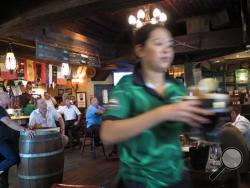DUBAI, United Arab Emirates (AP) — Dubai, the Mideast's desert party town, has just gotten even wetter.
The city-state is breaking new ground with its decision to loosen rules prohibiting day-time alcohol sales during the Muslim holy month of Ramadan, a move that reflects how much Dubai's rulers value the revenue both tourists and alcohol tax bring into this emirate.
In years past, those wanting a beer or a glass of wine needed to wait until sundown, when Muslims break the daylong Ramadan fast with their first sips of water and their evening meal called iftar. Bars in this city of skyscrapers would also play quiet music and make sure to hide those imbibing behind closed doors and tinted glass during the holy month.
Just before this Ramadan, however, Dubai's Department of Tourism and Commerce Marketing issued a seemingly benign notice to hotel managers across the emirate. Bars and nightclubs in Dubai are almost entirely limited to operating inside of or connected to hotels — even drink receipts at the Dubai International Airport show up as coming from a hotel attached to the airport.
That May 31 notice, obtained by The Associated Press, informed hotels that during the dates encompassing Ramadan, alcohol sales would be governed by normal rules, as opposed to limiting their hours.
Asked by the AP about the rule change, Dubai's Department of Tourism and Commerce Marketing said that "ensuring a superlative visitor experience consistently is at the center of our destination proposition and remains in line with Dubai's significance as a world-class tourism destination."
The tourism department did appeal on tourists to respect Ramadan rules.
"With nearly 1 million tourists expected to visit and enjoy all aspects of our city over Ramadan, we expect all operators and travelers to be respectful of the Holy Month and be mindful of cultural sensitivities," the department said in a statement.
It declined to say why officials decided to change the long-standing rules on alcohol this year.
Dubai, home of the long-haul airline Emirates, long has sought to make itself a tourism hub. It has the world's tallest building — the Burj Khalifa — as well as man-made islands, an indoor ski slope and miles of air-conditioned walkways in its high-end malls. Under-construction amusement parks and other attractions are planned ahead of it hosting the 2020 World Expo, a world's fair held every five years.
Part of Dubai's year-round tourism draw is also its alcohol sales, as Saudi Arabia, Kuwait and Iran ban the purchase of liquor and beer. Even neighboring Sharjah, another of the United Arab Emirates' seven sheikhdoms, bans it.
Beyond tourism, there's another lucrative reason for Dubai's rulers to sell alcohol.
Every beer poured and mixed drink decanted in a bar is subject to a 30-percent municipality tax. There's also a 50-percent import tax for alcohol, so drinking can be expensive, though tourists and residents can buy from duty-free stores at Dubai's airports or from bootleggers.
The taxes haven't slowed down drinkers. In 2014, the United Arab Emirates saw 67.2 million liters (17.8 million gallons) of beer and 20 million liters (5 million gallons) of spirits sold. That's according to research firm Euromonitor International, which also forecast that by 2019, a total of 91.2 million liters (24 million gallons) of beer and 27 million liters (7 million gallons) of spirits will be sold in the UAE.
"Strong population growth driven by political unrest in neighboring Arab countries and economic hardships in Europe ... is likely to drive the sales of alcoholic drinks over the forecast," Euromonitor said in an October 2015 report. "Strong investments in the real estate and hospitality industries in preparation for Expo 2020 will also push tourism higher, which will have a positive effect on alcoholic drinks."
Despite Dubai's flushed embrace of alcohol, the city-state's laws are incredibly strict. In theory, anyone transporting or consuming liquor, beer or wine at home must carry a government-issued liquor license, obtainable only after gaining their employer's permission. Anyone driving with any trace of alcohol in their system is subject to immediate arrest and charges.
Being drunk in public also is a criminal offense.
"Independently of any other crime, you certainly can get reported just for that," said Radha Stirling, a lawyer based in Britain who runs the advocacy group Detained in Dubai. "Anything else that you do while in the UAE, add alcohol to it and you'll certainly get a conviction for it."
___
Follow Jon Gambrell on Twitter at www.twitter.com/jongambrellap . His work can be found at http://bigstory.ap.org/content/jon-gambrell.

